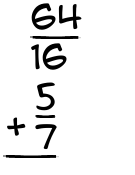What is 64/16 + 5/7?

|
Let's add
|
|||||||||||||||||||||||||||||||||||||||
Step 1We can't add two fractions with different denominators (the bottom number). So you need to get a common denominator - both bottom numbers need to match. To do this, you'll multiply the denominators times each other... but the numerators have to change, too. They get multiplied by the other term's denominator. So we multiply 64 by 7, and get 448, then we multiply 16 by 7 and get 112. Do the same for the second term. We multiply 5 by 16, and get 80, then multiply 16 by 7 and get 112. So now our fractions look like this:
|
|||||||||||||||||||||||||||||||||||||||
Step 2Since our denominators match, we can add the numerators. 448 + 80 = 528 Now we have an answer.
|
|||||||||||||||||||||||||||||||||||||||
Step 3Last of all, we need to simplify the fraction, if possible. Can it be reduced to a simpler fraction? To find out, we try dividing it by 2... Are both the numerator and the denominator evenly divisible by 2? Yes! So we reduce it:
So far so good... let's try to divide by that number again. Are both the numerator and the denominator evenly divisible by 2? Yes! So we reduce it:
So far so good... let's try to divide by that number again. Are both the numerator and the denominator evenly divisible by 2? Yes! So we reduce it:
So far so good... let's try to divide by that number again. Are both the numerator and the denominator evenly divisible by 2? Yes! So we reduce it:
So far so good... let's try to divide by that number again. No good. So next you try the next prime number, which is 3... No good. So next you try the next prime number, which is 5... No good. So next you try the next prime number, which is 7... No good. So next you try the next prime number, which is 11... No good. 11 is larger than 7. So we're done reducing. And we're done! Here's the final answer to 64/16 + 5/7
|